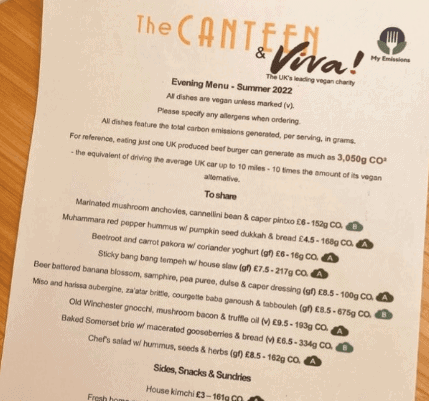The Canteen in Bristol has started including the carbon footprints of each dish on their vegetarian menu in an effort to encourage customers to think more about the environmental costs of their meal.
Diners can choose from dishes that produce as little as 16 grams of carbon dioxide emissions, like the carrot and beetroot pakoras topped with a yoghurt sauce or go for dishes with much greater carbon footprints, such as the miso and harissa aubergine with baba ghanoush and tabbouleh, at 675 grams of carbon dioxide, producing over 40 times more carbon dioxide.
This initiative is possibly the first of its kind and was undertaken in collaboration with leading UK vegan charity Viva! and food carbon calculations provider My Emissions. The Canteen has also decided to include more information on their menu, including the seasonality of the ingredients, the distance that they have travelled, and the emissions released during production.
This action comes in light of the government’s recent decision to enforce calorie information on the menus of restaurants with over 250 employees which shows that the government is able to implement industry-wide regulations. Viva! argues that displaying the carbon footprints of dishes is much more important as the climate crisis worsens, stating that including information like this can help consumers make more informed choices about their eating habits, which is ‘significantly more important to the health of the UK and the planet’. A recent German study found that diners are more likely to choose more climate-friendly dishes when carbon footprint data is shown on menus. These promising results show that simple informative measures can really make a difference to individual choices.
Laura Hellwig, managing director at Viva! states, ‘raising awareness of the carbon footprints from the production of meat, dairy, fish and eggs is crucial – a lot of people have no idea that eating one beef burger can be as damaging as driving the average UK petrol car for 10 miles.’ Viva! advocates for a vegan diet, arguing that it is the most impactful way that individuals can reduce their carbon footprint. There is a drastic difference in the emissions produced when comparing the carbon footprint of a beef burger, which produces 3.05 kg, to that of its vegan alternative, producing only 0.27 kg.
A recent study by Nature Food found that the food industry contributes approximately 40% of climate damage. The meat industry alone accounts for 60% of all greenhouses from food production.
Climate change isn’t our fault, but it doesn’t mean that we can’t do anything about it. While the big companies and conglomerates are ultimately to blame for fuelling this crisis, individual consumer choices can make a difference. Being informed on the amount of energy and carbon it takes to produce our meals could begin to alter food habits by bringing increased awareness.
Calculate your carbon footprint: https://myemissions.green/food-carbon-footprint-calculator/
Useful resources:
Gov.uk, 2022. Press release: New calorie labelling rules come into force to improve the nation’s health. Available at https://www.gov.uk/government/news/new-calorie-labelling-rules-come-into-force-to-improve-nations-health [accessed 22/09/22]
Viva! 2022. Why Carbon Footprints Must be Included on Menus. Available at https://viva.org.uk/planet/campaigns/carbon-menu/ [accessed 22/09/22]
Betz AK, Seger BT, Nieding G, 2022. How can carbon labels and climate-friendly default options on restaurant menus contribute to the reduction of greenhouse gas emissions associated with dining?. PLOS Climate 1(5). Available at https://doi.org/10.1371/journal.pclm.0000028 [accessed 22/09/22]
Viva! 2022. Bristol restaurant first to prioritise carbon footprints over calories on menu. Available at https://viva.org.uk/media-centre/bristol-restaurant-first-to-prioritise-carbon-footprints-over-calories-on-menu/ [accessed 22/09/22]
Viva! 2022. Why Carbon Footprints Must be Included on Menus
Xu, X., Sharma, P., Shu, S. et al., 2021. Global greenhouse gas emissions from animal-based foods are twice those of plant-based foods. Nature Food 2, pp. 724–732 Available at https://doi.org/10.1038/s43016-021-00358-x [accessed 22/09/22]
Xu, X., Sharma, P., Shu, S.et al., 2021. Global greenhouse gas emissions from animal-based foods are twice those of plant-based foods.

05/10/2022




